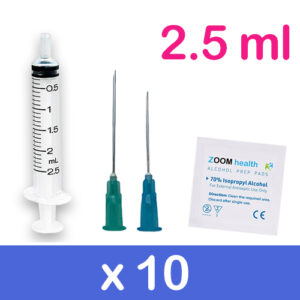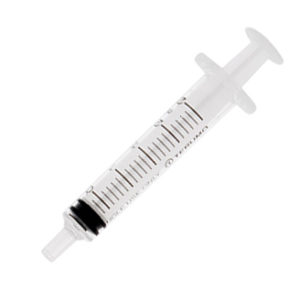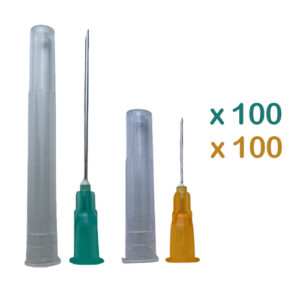Syringes & Needles
Getting to Know Syringes and Needles
Medical syringes and needles are essential medical supplies used for injections, drawing blood, and various other medical procedures. While commonly used in hospitals and clinics, an increasing number of people now buy syringes and needles for at-home use.
When shopping for syringes and needles online, quality and safety should be your top concerns. This guide will provide a comprehensive overview of medical syringes and needles to help you find the right products for your needs.
An Introduction to Medical Syringes and Needles
Syringes are devices used to inject fluid into or withdraw fluid from the body. They consist of a plunger, barrel, tip opening, and needle. The needle is attached to the syringe to puncture the skin and access veins, tissue, or body cavities.
Syringes are commonly made of plastic while needles are made of surgical stainless steel. Both are designed for single use and come packaged in sterile containers.
There are many types of syringes and needles for various purposes:
- Hypodermic needles – For injecting medication under the skin
- Intravenous needles – For injecting into veins
- Insulin syringes – For injecting insulin
- Tuberculin syringes – For intradermal injections
- Blood collection needles – For drawing blood samples
Syringes and needles come in different sizes measured by gauge, length, and volume capacity. Higher gauge numbers indicate thinner needles.
Buying High-Quality Syringes and Needles
When purchasing syringes and needles, quality should be a top concern. High-quality products from reputable suppliers ensure:
- Sterility – Syringes and needles must be sterile to prevent infection.
- Precision – The graduation markings on the syringe barrel should be precise and needles sharp.
- Safety – Syringes and needles should have safety features to prevent needlestick injuries.
- Reliability – Products should consistently work as intended without failures.
Only buy from trusted medical supply companies that adhere to regulatory standards for quality manufacturing and testing. Reputable suppliers will provide documentation ensuring their products are safe for medical use.
Checking for a CE quality mark is a good way to verify syringes and needles meet EU safety standards. The CE mark indicates the products comply with European Medical Device Directives for design, labeling, sterilization, and other quality measures.
Types of Syringes and Needles
There are many options when it comes to selecting syringes and needles for your specific needs:
Syringes
- Standard syringes – Feature a smooth tip and luer lock for attaching needles. Common sizes range from 1ml to 60ml.
- Luer slip syringes – Designed with a slip tip to attach needles without twisting. Available in various sizes.
- Retractable syringes – Have a mechanism to retract the needle after use to prevent needlestick injuries.
- Insulin syringes – Precisely measure doses less than 1ml. Graduated with smaller increments for accurate dosing.
Needles
- Gauges – Higher gauge numbers indicate thinner needles (e.g. 25g). Lower gauge numbers are thicker (e.g. 18g).
- Lengths – Common lengths range from 3/8 inch to 1 1/2 inches. The length affects how deep the needle can penetrate.
- Tip designs – Needles come in regular wall, thin wall, or ultra-thin wall thicknesses. Some have tri-bevel or pencil-point tips.
- Safety needles – Designed with covers or retractable mechanisms to shield the needle after use.
- Butterfly needles – Have flexible “wings” that make veins easier to access. Used for blood draws and IV insertions.
Always match the needle gauge, length, and syringe size to the injection type and location on the body. Your healthcare provider can recommend the most appropriate supplies.
Purchasing Syringes and Needles Online
Online medical shops offer convenience and competitive pricing when buying syringes, needles, and other supplies. Here are some tips for smart online purchasing:
- Compare prices between online shops to find the best deals. Look for bulk discounts on larger quantity orders.
- Check return policies in case you need to exchange unsuitable products.
- Read product reviews and shopper feedback to help choose quality supplies.
- Beware of counterfeit products from disreputable sellers. Only buy from trusted stores.
- Look for free shipping promotions and fast delivery options.
- Purchase convenient injection kits containing common supplies all in one package.
- Opt for discreet, plain packaging when possible for deliveries.
Reputable online medical supply retailers make purchasing syringes, needles, and other equipment easy and affordable. With the variety of syringe and needle types, you can find options suiting your specific medical requirements.
Safe Use and Disposal
To prevent infection and injuries, it is critical to use and dispose of syringes and needles safely:
- Follow aseptic technique when handling syringes and needles. Wash hands thoroughly and wipe vial tops with alcohol.
- Never reuse disposable syringes or needles. Always use sterile ones out of the package.
- Discard used sharps in an approved puncture-proof container. Never throw loose needles in the trash.
- Check with your local waste authority about proper medical sharps disposal programs. Some communities have take-back days or drop-off locations.
- Never attempt to break, recap, or detach needles from syringes. This can lead to accidental needlesticks.
By purchasing high-quality supplies and using proper injection and disposal technique, syringes and needles can be utilized safely for at-home medical care.
In Summary
Syringes and needles are staple medical supplies with many healthcare applications. When selecting products for personal use, be sure to buy from reputable sources and choose options appropriate for your particular medical needs. Follow safety and hygiene protocols for protecting yourself and others. With the range of syringes and needles available online today, you can conveniently order all the necessary equipment for administering medications, blood draws, injections, and other medical procedures.



